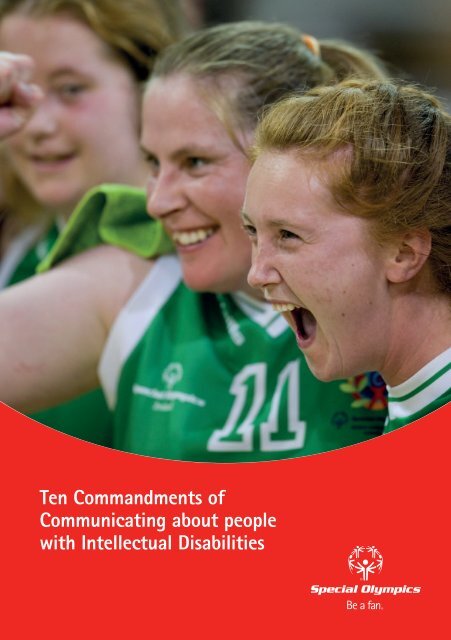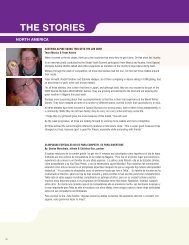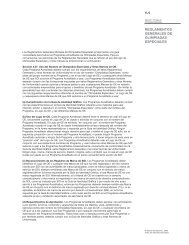The Ten Commandments - Special Olympics
The Ten Commandments - Special Olympics
The Ten Commandments - Special Olympics
- No tags were found...
Create successful ePaper yourself
Turn your PDF publications into a flip-book with our unique Google optimized e-Paper software.
<strong>Ten</strong> <strong>Commandments</strong> ofCommunicating about peoplewith Intellectual Disabilities
3Dodepict people with intellectual disabilities interacting with others withand without intellectual disabilities.Be aware that presenting people with intellectual disabilities as being lonely or isolatedcan serve to strengthen fears and misconceptions.4Offerbalance. Portray people with intellectual disabilities in positive relationshipswith their families and care assistants.<strong>The</strong> sole description of dramatic and difficult family stories strengthens stereotypicalperceptions about the burden, inconvenience and suffering borne by families.5Considershowing people with intellectual disabilities living in society, participatingin every facet of life – at home, at work, shopping in the mall, hanging outwith friends at coffee shops, simply being part of the population.Continual depictions of people with intellectual disabilities in unusual environments suchas hospitals or residential homes serve to create distance, and make it difficult for audiencesto identify with their situation.5
6Giveopportunities for people with intellectual disabilities to talk about theireveryday needs, their jobs, their pastimes and passions.Do not sensationalise the accomplishments of persons with disabilities. While theseaccomplishments should be recognised and applauded, be aware of the potential negativeimpact of referring to the achievements of people with physical or intellectual disabilitieswith excessive hyperbole.7Movethe focus from parents of people with intellectual disability,to the person itself. By focusing on parents, people with intellectual disabilitiesare placed in secondary position and deprived of their own individuality.8Demonstratethat people with intellectual disabilities are NOT sick,CANNOT infect others.A person has an intellectual disability, rather than is “suffering from,” is “afflicted with”or is “a victim of” intellectual disabilities.Similarly a person “uses” a wheelchair, rather than is “confined” or “restricted to” a wheelchair.6
9Donot use the adjective “unfortunate” when talking about persons with an intellectualdisability. Disabling conditions do not have to be life-defining in a negative way.Emphasise how people with intellectual disabilities are self-reliant in their everydayactivities whether it’s at home or in work, thus demonstrating their individualityand independence.10Aboveall, speak and write about people with intellectual disabilitiesin the media.<strong>The</strong> less frequently people with ID are portrayed in the media the more “invisible” they become.<strong>The</strong> more “invisible” they become the harder it is to change negative stereotypes and to promoterespect, acceptance and inclusion for all.7
WHAT IS INTELLECTUALDISABILITY?8
INTELLECTUAL DISABILITY- How does it differ from mental illness?Intellectual disability is characterised by significantly below-average intellectual functioning(generally regarded as IQ below 70) combined with impairment in carrying out varying aspects of dailylife and adapting to the normal social environment.Intellectual disability is not a disease. Causes for intellectual disability are numerous including braindamage or stunted development as a child.Intellectual disability is not a type of mental illness, like depression. <strong>The</strong>re is no cure for intellectualdisability.Intellectual disability occurs since birth or early childhood.Mental illness occurs normally during adolescence, mostly during critical situations. Persons with mentalillness had in their past a period of normal life, including educational development.How do you treat for intellectual disabilities?<strong>The</strong>re is no medicine as such to treat intellectual disability. Encouraging physical, cognitive and socialdevelopment, as well as speech development can result in noticeable improvements, especially when suchactivities are regular and undertaken when indicators emerge for the first time. Education, homeschooling, therapy and rehabilitation all bring benefits. It is also important to provide peoplewith intellectual disabilities with opportunities to lead a regular life with activities suitable to their ageand in open environments where they can interact with their peers. <strong>The</strong> objective is always towardhelping them achieve independence and self-reliance.Treating mental illness usually follows a path of medication administered alongside psychotherapyand/or occupational therapy.What changes can you expect?Intellectual disability is not subject to radical change. With the course of treatment mentioned above,you would observe constant but slow progress, both during childhood, as well as in adulthood.Improved abilities and confidence in social settings are particularly evident when a person with disabilitybecomes employed and is successful at work.9
















